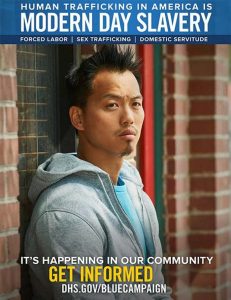Let’s prevent human trafficking in the CNMI

The poster commemorating National Slavery and Human Trafficking Prevention Month this January. (Contributed Photo)
January 2018 is National Slavery and Human Trafficking Prevention Month, as declared by President Trump on Dec. 29, 2017.
“Human traffickers prey on their victims by promising a life of hope and greater opportunity, while delivering only enslavement,” Trump said. Human trafficking is about exploitation of people for sex or labor. It is a global problem, with complex schemes and lucrative incentives.
“We’re doing things this month,” said Lauri Ogumoro, “to keep the focus on combatting human trafficking in the CNMI.”
Government agencies, including the U.S. Department of Justice, U.S. Department of Labor, U.S. Department of Homeland Security, the CNMI Office of the Attorney General, the CNMI Department of Labor, the Division of Public Health of the Commonwealth Healthcare Corp., Department of Public Safety, and Public School System, along with community organizations that include Karidat, Micronesian Legal Services Corp., and Pacific Ombudsman for Humanitarian Law, and the faith community are active participants in the CNMI’s Human Trafficking Intervention Coalition.
The coalition is also reaching out to the business community to forge important partnerships in preventing sex and labor exploitation. It encourages everyone in the CNMI to make a special effort this month to join in the fight against human trafficking.
“The CNMI has made progress in its fight against human trafficking,” said Eric O’Malley of the U.S. Attorney’s Office. “The CNMI used to be listed as a hotspot in the State Department’s annual report. We’ve improved, but we need to be vigilant because human trafficking still occurs here.”
The CNMI has improved identification of potential trafficking victims and stepped up enforcement with successful prosecutions for sex trafficking and labor exploitation.
The coalition has plans for 2018 to continue its efforts at heightened identification through trainings of medical professionals and other first responders. This goal mirrors the goal of government agencies to strengthen the healthcare industry’s anti-trafficking response.
“Everyone can contribute to the solution,” said Jane Mack of MLSC. “What each member of the community can do to combat human trafficking is participate, donate, and read.”
Participate
The human trafficking coalition is asking everyone to wear blue on Thursday, Jan. 11, 2018, Human Trafficking Awareness Day. Take photos of yourself, your family, your friends, your co-workers, all wearing blue, and post on social media with hashtags: #WearBlueDay, #EndTrafficking, #CNMISolidarity.
People can also participate by watching the coalition on the news on Jan. 10, and by watching for public service announcements on television, and listening for them on the radio. Talk about the problem.
Donate
Members of the community can donate to any of the private organizations participating in anti-human trafficking activities (Karidat, MLSC, POHL) or to your faith community, with a special request that your donation be used for anti-trafficking activities.
Read
There are books, both fiction and non-fiction, to read about human trafficking. There are articles online. There are videos to watch. The coalition urges everyone to look for them, and read-up to be informed about the problems and the solutions. The following are a starting point, but the coalition encourages everyone to explore information about human trafficking.
Some books to read are Sold by Patricia McCormick, The Berlin Turnpike by Raymond Bechard, and Life Interrupted by Denise Brennan.
Available online articles include “My Family’s Slave” in the Atlantic, https://www.theatlantic.com/magazine/archive/2017/06/lolas-story/524490/ and “Labor Trafficking in the US: a Closer Look at Temporary Work Visas” at Polaris, http://polarisproject.org/sites/default/files/Temp%20Visa_v5%20%281%29.pdf .
Interesting videos include the TED Talk by Noy Thrupkaew, https://www.ted.com/talks/noy_thrupkaew_human_trafficking_is_all_around_you_this_is_how_it_works and The Five Disguises of Traffickers, by CNN Freedom Project, https://www.youtube.com/watch?v=3uPTzhbBMpU .
Human trafficking is the opposite of respect for freedom and civil rights. The awareness and prevention campaign ends on Feb. 1, 2018, National Day of Freedom. The coalition will continue working so that every day can be a national day of freedom for all in the CNMI. (PR)



























